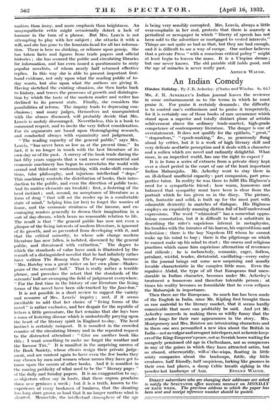An Indian Comedy Hindoo Holiday. By J. R. Ackerley. (Chatto
and Windus. Ss. Gil.) Mn. J. H. ACKERLEY'S Indian journal leaves the reviewer in some embarrassment as to the terms in which be must praise it. For praise it certainly demands ; the difficulty is to control one's enthusiasm and to praise it temperately, for it is certainly one of those books of rare occurrence which stand upon a superior and totally distinct plane of artistic achievement above the ordinary trade-market, high-grade competence of contemporary literature. The danger is one of overstatement. It does not qualify for the epithets, "great," "stupendous," "epoch-making," &c., so generously flung about by critics, but it is a work of high literary skill and very delicate aesthetic perception and it deals with a character and a milieu which are novel and radiantly delightful. What more, in an imperfect world, has one the right to expect ?
It is in form a series of extracts from a private diary kept over a short period in the court of one of the least important Indian Maharajahs. Mr. Ackerley went to stay there in an ill-defined unofficial capacity : part companion, part pros- pective tutor. In reality he was there to fulfil Ills Highness's need for a sympathetic friend ; how warm, humorous and balanced that sympathy must have been is clear from the portrait which he has given its in the diary. The picture, rich, fantastic and solid, is built up for the most part with admirable dexterity in snatches of dialogue. His Highness employs an exquisitely amusing diction full of half-understood expressions. The word "whimsical" has a somewhat oppro- brious connotation, but it is difficult to find a substitute in describing the ruler's capricious interest in metaphysics, his troubles with the inmates of his harem, his superstitions and indecision ; there is the boy Napoleon III whom he cannot make up his mind to buy ; there is the pilgrimage on which lie cannot make up his mind to start ; the omens and religious practices which cause him capricious alternation of reverence and ridicule ; he is melancholy, romantic, eager, listless, petulant, wistful, tender, dictatorial, vacillating—every entry. in the journal brings out some new surprising and usually lovable characteristic in the complex little man. Even the repulsive Abdul, the type of all that Europeans find unen- durable in Indian character, becomes under Mr. Aekerley's treatment a humorous and therefore tolerable person ; at times his reality becomes so formidable that he even eclipses the Maharajah in importance.
Then there are the Europeans. So much fun has been made of the English in India, since Mr. Kipling first brought them as raw material to the literary market, that it seems hardly conceivable that more can profitably be said. And yet Mr. Ackerley succeeds in making them so wildly funny that the reader longs for their rare appearances in the story. Mrs. Montgomery and Mrs. Bristow are intoxicating characters and in them one sees personified a new idea about the British in India—not as vulgar and arrogant interlopers,not as heroic keep- ers of the King-Emperor's peace, not as liverish bores waiting for meagrely pensioned old age in Cheltenham, not as conquerors in any of the guises in which they have attracted satire, but as absurd, otherworldly, will-o'-the-wisps, floating in 'little misty companies about the landscape, futile, shy little creatures, half friendly, half suspicious, lurking like gnomes in their own bad places, a damp Celtic breath sighing in the powder-hot landscape of Asia. EVELYN WAUGH.








































 Previous page
Previous page